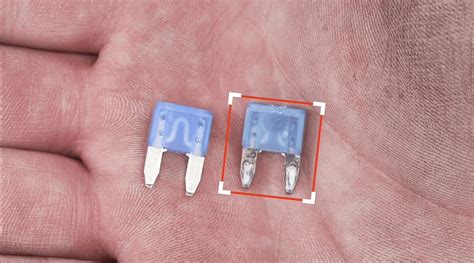How to Tell if a Car Fuse Is Blown: A Simple Guide
Knowing how to check your car's fuses is a crucial DIY skill that can save you time and money. A blown fuse can cause a variety of electrical problems, from non-functioning headlights to a dead radio. This guide will walk you through how to easily identify a blown fuse.
Understanding Car Fuses
Before we dive into how to check, let's briefly understand what a fuse does. A fuse is a small, safety device that protects your car's electrical system from overloads. If too much electricity flows through a circuit, the fuse melts, breaking the circuit and preventing damage to more expensive components.
Visual Inspection: The First Step
The simplest method to check a fuse is through a visual inspection. Locate your fuse box (usually under the hood or inside the car, often near the dashboard). The fuse box cover usually has a diagram showing which fuse controls what.
What to Look For:
- Broken Filament: The most obvious sign of a blown fuse is a visible break in the thin metal filament inside the fuse. You'll see a clear gap in the wire.
- Discoloration: A blown fuse might show signs of discoloration, such as darkening or burning. This indicates excessive heat generated before it blew.
- Bulging Fuse: Sometimes, a blown fuse will appear slightly swollen or bulging. This is a result of the heat generated during the overload.
Important Note: If you're unsure about any fuse, it's best to err on the side of caution and assume it might be blown.
Using a Fuse Tester (For More Accurate Results)
While visual inspection is often sufficient, a fuse tester provides a more accurate and reliable way to check your fuses. These inexpensive tools are readily available at most auto parts stores. They work by testing the continuity of the fuse.
How to Use a Fuse Tester:
- Turn off the ignition: This is a crucial safety step.
- Remove the suspect fuse: Use fuse puller pliers (usually included in the fuse box) to carefully remove the fuse.
- Test the fuse: Insert the fuse into the fuse tester. The tester will usually indicate whether the fuse is good or blown via a light or other indicator.
Using a fuse tester eliminates any guesswork involved in visual inspection.
Replacing a Blown Fuse
Once you've identified a blown fuse, replacing it is straightforward.
- Match the amperage: Always replace the fuse with one of the same amperage rating. The amperage rating (usually printed on the fuse) indicates the maximum current the fuse can handle. Using a fuse with a higher amperage rating could cause damage to your car's electrical system.
- Insert the new fuse: Carefully push the new fuse into the empty fuse slot.
- Test the circuit: Turn the ignition back on and check if the circuit is now working correctly.
If the new fuse blows immediately after replacement, there's likely a more serious underlying electrical problem that needs professional attention. Continuing to replace fuses without addressing the root cause could damage your car's electrical system.
Troubleshooting Tips
- Consult your owner's manual: Your owner's manual should have a detailed fuse box diagram specifying the purpose of each fuse.
- Start with the obvious: If you're experiencing a specific electrical problem (e.g., non-working headlights), check the fuse specifically associated with that circuit.
- Don't ignore the problem: A consistently blowing fuse signals a more significant electrical issue that needs prompt professional diagnosis.
By following these steps, you'll be well-equipped to handle blown fuses and keep your car's electrical system running smoothly. Remember safety first, and don't hesitate to seek professional help if you're uncomfortable working with your car's electrical system.
